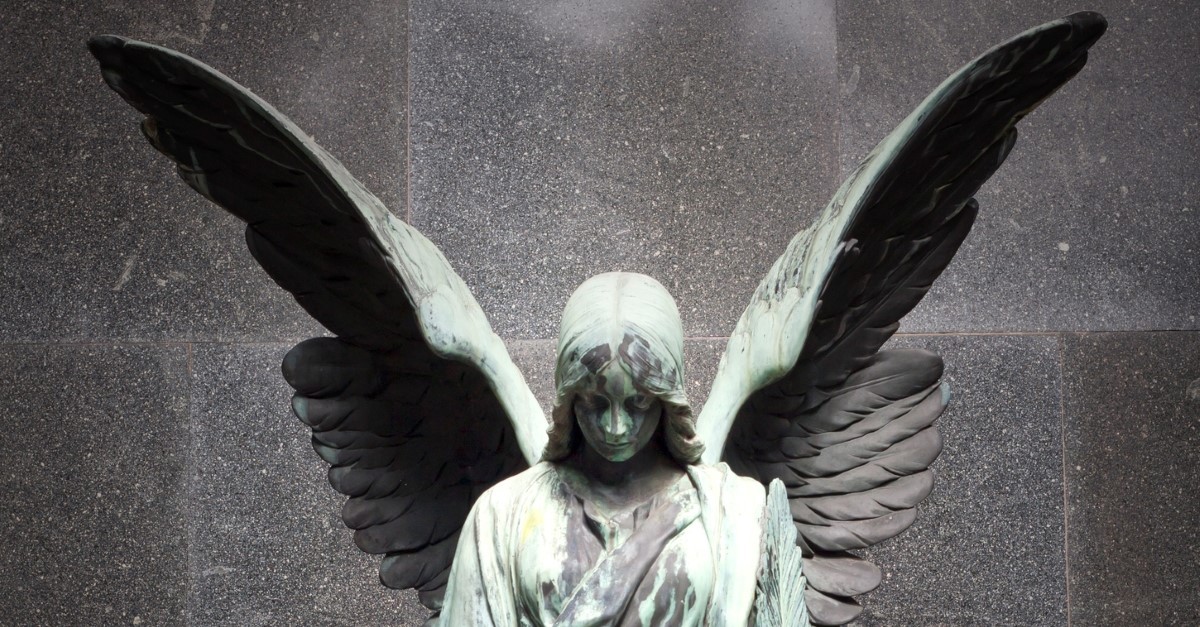
Angels activate our imagination. Popular media and culture portray them with wings, as strong warriors, or as cute, precious babies. Frank Peretti’s This Present Darkness included glimpses into the unseen realm of demons and angels, and fantastic battles with swords—surely part of the reason the book sold so many copies.
While fun to imagine, it’s also important for Christians to distinguish between creative portrayals of angels and what the Bible actually says. One of the questions many people have regarding angels is a simple one. Can angels die? Does the Bible give us any clues? Let's explore this question more in this article.
Photo credit: ©Getty Images/mbolina

Wha Does the Bible Say about Angels?
We should first establish the biblical teaching on angels. The Scripture shares how they are real, created beings who serve God. The Lord has them play important roles in his plans.
The word angel comes from the Greek angelos, meaning messenger. Originally, the Hebrew uses the word mal’ak, also meaning messenger. Along with bringing God’s words, the Bible shows us how angels perform a number of tasks for God.
We first see angels at the beginning of the Bible, in Genesis 3:24. After Adam and Eve were exiled from the Garden of Eden, God placed cherubim with flaming swords to guard the entrance to paradise, to protect the Tree of Life and immortality from corrupted beings. Throughout the Old Testament, angels serve God as warriors and protectors. In Genesis 18-19, angels visit Abraham and enter Sodom to rescue Lot and his family from destruction. In Exodus 23:20, God promises to send an angel ahead of Israel in the wilderness to clear the way of enemies and lead the people. An angel shuts the mouths of lions to protect Daniel (Daniel 6:22).
Moving to the New Testament, angels continue to be involved. An angel announces Christ’s birth to Mary (Luke 1:26-38) and reveals information to her betrothed, Joseph, in dreams (Matthew 1:20-21). After the cross, at the tomb, an angel declares Jesus’ resurrection to women who had arrived to care for the body (Matthew 28:5-7). Hebrews 1:14 describes angels as “ministering spirits sent forth to minister for those who will inherit salvation.”
Angels also act as warriors in the unseen realm. An angel fought a spiritual battle while Daniel prayed (Daniel 10:12-13). Revelation 12 shows Michael and his angels fighting against Satan and the fallen angels. In Revelation 8-9, angels announce and carry out God’s judgment. Jesus taught in Matthew 13:41-43 how angels will help distinguish between the righteous and the wicked. There is even an angel that carries out the judgment of death.
While angels are powerful and glorious, the Bible clearly says we shouldn’t worship them (Revelation 22:8-9). They are fellow servants, not gods, and they obey God’s will and mission.
Photo credit: ©Getty Images/bestdesigns

Do Angels Have Souls?
Scripture doesn’t explicitly say angels have souls, at least not in the same way we do. The Bible almost exclusively uses the idea of a soul (the Hebrew nephesh, the Greek psyche) to refer to humans. However, the Bible does present angels as beings with qualities we might associate with having a soul.
Angels show intellect and knowledge, and are able to interact as people with humans. In Daniel 9:21-22, the angel Gabriel explains the meaning of Daniel’s vision. The apostle Peter writes how angels long to look into mysteries of salvation (1 Peter 1:12), showing curiosity and interest, signs of a personal consciousness.
Angels have emotions. In Job 38:7, they shout for joy at God’s creation. Jesus later teaches, “There is joy in the presence of the angels of God over one sinner who repents.” (Luke 15:10) Angels respond with awe and wonder, rejoicing over God’s creative power and innovation, an emotional response. And angels don’t just obey God when they fight for and protect us. They care about what happens, for a sinner to escape the pain of hell and be redeemed.
Angels have the ability to choose, as some rebelled against God. Isaiah 14 and Ezekiel 28 speak about earthly kings, but scholars and Christian leaders note how the prophets align those human actions to the heart of Satan, once a high-ranking angel. The Bible further supports this in Revelation 12:7-9, which confirms how Satan and his angels chose to rebel against God and were cast out of heaven. Jude 6 talks about the consequences of such action, “The angels who did not keep their proper domain … He has reserved in everlasting chains.”
The good angels act with will, as well, but they do so in obedience to God. Jesus implies the angelic submission to God when he tells Pilate he could ask the Father for legions of angels to protect him if he so pleased (Matthew 26:33). Instead, he willingly gave his life so we could live eternally.
While angels have intellect, emotion, and will, giving them some semblance of a soul, they weren’t made in God’s image. And unlike humans, angels don’t receive redemption. If they rebel, their consequences are final.
Photo credit: ©GettyImages/udra

What Should Christians Know about Angelology?
Angelology is the study of angels, and Christians should approach the topic with caution. The Bible affirms the existence and work of angels, but Scripture also warns against speculation and worship of angels.
Modern angelology truly began to develop in Jewish thought during the time between Malachi and Jesus, those 400 years before Christ. Writings like 1 Enoch and other apocalyptic books explored hierarchies of angels, named several specific ones, and gave epic or cosmic roles. These ideas influenced what became known as Jewish mysticism, especially Kabbalistic doctrine. Jewish mysticism began to focus more on the angelic power structures, names, and angelic experiences.
Some teaching within this mysticism began with biblical texts and beings like Michael and Gabriel, but much of angelology goes far beyond Scripture. It included extra-biblical (and speculative) ideas about different layers of heaven, what other religions called “secret knowledge,” and spiritual beings acting like mediators between God and humanity. This placed more distance between God and people, not bringing them closer as Christ died to accomplish. Jewish mysticism started influencing some Christian texts, particularly the Gnostic groups, trying to mix their bad doctrine with the Bible.
The New Testament clearly warns against Gnostic and speculative mysticism. Paul cautions believers in Colossians 2:18, saying such false humility and the “worship of angels” would disqualify them as believers, causing pride about personal visions instead of the person of Jesus. The apostle Paul, educated as a Pharisee and in Greek thought, rejected the angel worship that had started mixing with the church. In a similar way, Paul warns against any Gospel not consistent with the one he preached, even if an angel would deliver it (Galatians 1:8), implying the danger of elevating angelology beyond the biblical testimony. Paul also comments on how Satan can deceive by appearing as an angel of light (2 Corinthians 11:14), as a warning against false teachers.
Christian angelology should stay grounded in Scripture. Angels are powerful beings, but they can’t take the place of Christ. Angels can’t forgive sins, offer salvation, be worshipped, or be the mediator between God and humanity.
In modern times, angelology has been distorted by new paganism, pop culture, and New Age spirituality. Different media sources present speculative ideas about guardian angels, angelic numbers, and private messages from heavenly beings. As believers, we’ve been given the Holy Spirit and must check all doctrines against God’s Word, testing the spirits behind the message (1 John 4:1).
Photo credit: ©Getty Images/NikkiZalewski

Can Angels Die?
Angels have some sort of soul, and they engage in battle. Since they are made of different material than humans, the Bible never shows them dying. God created them before the foundation of this world as spiritual beings who don’t die like humans do. Angels exist in a separate reality, a spiritual and eternal one, apart from this world in which things can physically die.
Jesus makes this point in Luke 20:36, where he says humans who are resurrected to eternal life “can no longer die; for they are equal to the angels and are sons of God.” Jesus equates the human, immortal, and eternal resurrection with the state of angels, at least in that there’s no death.
The Bible consistently reveals angels (whether obedient or fallen) as existing eternally. They don’t age, decay, or die like the things of this earth.
However, this immortality doesn’t mean they escape judgment. Though they can’t die, fallen angels will face eternal punishment. Revelation 20:10 predicts, “The devil who deceived them was cast into the lake of fire and brimstone … and they will be tormented day and night forever and ever.” The lake of fire is also the destiny of the fallen angels who followed Satan in his rebellion (Revelation 12:4, 2 Peter 2:4).
Such everlasting torture shows how fallen angels won’t be destroyed or die as a consequence. Since they’re immortal and can’t die, their punishment will be eternal. They don’t have the opportunity to repent or change, to escape this consequence. Hebrews 2:16 says that Jesus “does not give aid to angels, but He does give aid to the seed of Abraham.” Angelic rebellion becomes a permanent choice. Humans can repent while alive, and we can die, after which we stand at judgment.
Obedient and faithful angels serve God forever. Revelation 5:11-12 reveals heaven, where thousands of angels worship God and the Lamb, which they will continue to do for all eternity.
Angels can’t die and don’t stop existing. They reveal to us God’s glory and the absolute nature of his heavenly order.
Image created using DALL.E 2024 AI technology and subsequently edited and reviewed by our editorial team.

Originally published Friday, 27 June 2025.
